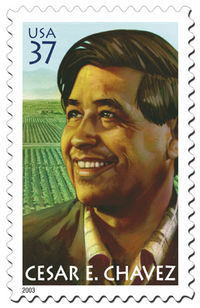Results 1 to 1 of 1
Thread Information
Users Browsing this Thread
There are currently 1 users browsing this thread. (0 members and 1 guests)
-
08-22-2013, 10:54 PM #1Junior Member

- Join Date
- Jul 2013
- Posts
- 19
Even Cesar Chavez was against too much immigration...
"Cesar Chavez saw the promise of change – the unlimited potential of a community organized around a common purpose."
— President Barrack Obama

Pro-immigration activists revere Cesar Chavez as a hero, which is in some ways very ironic.
Cesar Chavez strove to improve the working conditions and wages of farm workers by restricting the supply of workers; to raise the equilibrium wage to a level where they could live better than farm animals.
To that end, Chavez’s men picketed the INS to get them to enforce immigration laws. Chavez ratted out his fellow Mexicans to the INS if they were illegals. If he found them on the job, he turned a blind eye while his men administered beatings. And in 1973, Chavez even sent his troops to the border to battle illegals!
"Chavez next ran headlong into another vexing problem. Floods of immigrants from Mexico-some with work permits – others arriving illegally – were hamstringing Chavez's strike and boycott efforts in California and across the Southwest. He tried in vain to stem the tide of undocumented workers, especially those hired as strikebreakers. Reports came out that Chavez turned his head on occasion when his supporters used violence against illegal workers. Manuel Chavez was even accused of attacking strikebreakers attempting to cross the Rio Grande into the United States. Cesar Chavez talked with Mexican officials about the problem and even visited Mexico in an attempt to stop the flow of illegal workers,"
"César Chávez: A Brief Biography with Documents", Richard W. Etulain, p18
"Despite the fact that Chávez is these days revered among Mexican-American activists, the labor leader in his day was no more tolerant of illegal immigration than the Arizona Minutemen are now. Worried that the hiring of illegal immigrants drove down wages, Chávez – according to numerous historical accounts – instructed union members to call the Immigration and Naturalization Service to report the presence of illegal immigrants in the fields and demand that the agency deport them. UFW officials were even known to picket INS offices to demand a crackdown on illegal immigrants. And in 1973, in one of the most disgraceful chapters in UFW history, the union set up a 'wet line' to prevent Mexican immigrants from entering the United States. Under the guidance of Chávez 's cousin, Manuel, UFW members tried at first to convince the immigrants not to cross. When that didn't work, they physically attacked the immigrants and left some bloody in the process. It happened in the same place that the Minutemen are now planning to gather: the Arizona-Mexico border. At the time, The Village Voice said that the UFW conducted a 'campaign of random terror against anyone hapless enough to fall into its net.' In their book, "The Fight in the Fields," Susan Ferris and Ricardo Sandoval recall the border incident and write that the issue of how to deal with the undocumented was 'particularly vexing' for Chávez."
"The Arizona Minutemen and César Chavez", Ruben Navarrette Jr., Union-Tribune, March 30, 2005


 LinkBack URL
LinkBack URL About LinkBacks
About LinkBacks




 Reply With Quote
Reply With Quote

Man with alleged ties to ISIS lived in US for two years prior to...
05-03-2024, 07:47 AM in illegal immigration News Stories & Reports